Découvrez Folk, le CRM pour les entreprises axées sur les ressources humaines
Le social selling n'est pas seulement un mot à la mode : c'est l'avenir de la vente.
| Points principaux |
|---|
|
Pourquoi le social selling est-il important aujourd'hui ?
Dans un monde où les appels à froid sont ignorés et où les boîtes de réception sont saturées, le social selling vous permet d'entrer en contact avec des clients potentiels sur les plateformes qu'ils utilisent déjà, en instaurant un climat de confiance et en nouant des relations plutôt qu'en leur imposant des produits.
Dans ce guide, nous vous expliquerons en détail ce qu'est le social selling, quelles sont les meilleures plateformes à utiliser, les meilleures stratégies pour booster vos efforts et les outils les plus efficaces pour maîtriser cette approche.
Prêt à transformer la manière dont votre équipe commerciale de 20 à 50 personnes peut vendre plus efficacement en 2025 ?
👉🏼 Essayez Folk dès maintenant pour gérer les rappels basés sur les contacts avec votre équipe.
Qu'est-ce que le social selling ?
Le social selling consiste à utiliser les réseaux sociaux pour trouver, entrer en contact, comprendre et entretenir des prospects commerciaux. Il ne s'agit pas de démarchage à froid, mais plutôt d'établir des relations authentiques qui se transforment en ventes au fil du temps.
Au lieu de s'appuyer sur des tactiques dépassées telles que les appels à froid ou les envois massifs d'e-mails, le social selling s'effectue sur les plateformes où vos prospects passent déjà du temps, principalement :
- X (anciennement Twitter)
- Parfois Facebook ou TikTok, selon votre public
En quoi le social selling peut-il vous aider ?
✅ Établissez une relation de confiance grâce à des interactions cohérentes et utiles
✅ Positionnez-vous (et votre marque) en tant qu'expert dans votre domaine
✅ Préparez vos prospects avant le premier contact commercial
✅ Accélérez la vitesse de conclusion des transactions
✅ Générez davantage de prospects entrants qualifiés
Et les chiffres le prouvent : 78 % des vendeurs sociaux vendent plus que leurs collègues qui n'utilisent pas les réseaux sociaux.
Principaux canaux de vente sociale
Vente sociale sur LinkedIn
LinkedIn est de loin la meilleure plateforme pour la prospection B2B, le réseautage et le marketing de contenu. Elle permet aux entreprises de renforcer leur autorité et leur crédibilité en partageant des contenus pertinents et en interagissant avec des professionnels.
Avantages
- Conçu pour le B2B
- Filtres avancés et Sales Navigator
- Les contenus longs fonctionnent bien
Inconvénients
- Cela prend beaucoup de temps pour bien le faire.
- Espace concurrentiel
Meilleures pratiques
- Envoyer des messages privés personnalisés
- Commentez régulièrement les publications de l'ICP.
- Utilisez le contenu pour susciter la conversation (et non pour vendre)
Twitter (X)
Twitter est une plateforme puissante pour le leadership éclairé, les actualités du secteur et l'engagement en temps réel. Son rythme rapide permet des interactions rapides et la participation à des conversations tendance.
Avantages
- Rejoignez rapidement et facilement les conversations tendance
- Idéal pour partager des bouchées savoureuses
- Idéal pour la recherche de prospects à l'aide de hashtags et de listes
Inconvénients
- Durée de vie courte du contenu
- Plus difficile à suivre les conversions
Meilleures pratiques
- Suivez et interagissez avec votre ICP
- Utilisez la recherche avancée pour identifier des prospects
- Partagez vos idées, pas seulement des liens
Instagram est un outil de narration visuelle très efficace, idéal pour développer une image de marque et créer des liens autour d'un certain style de vie. Il est parfait pour les entreprises qui misent sur l'esthétique, les émotions et les interactions informelles.
Avantages
- Idéal pour les entreprises axées sur le mode de vie ou les produits
- Idéal pour créer des liens émotionnels
- Les stories et les messages privés Instagram permettent des interactions informelles.
Inconvénients
- Plus difficile pour la génération de prospects B2B
- Pas idéal pour les produits complexes
Meilleures pratiques
- Utilisez les sondages et les questions-réponses de Stories pour susciter l'engagement.
- Partager les résultats des clients ou la culture d'équipe
- Ajoutez un lien vers votre contenu dans votre biographie ou vos stories.
Les meilleures stratégies de vente sociale
Les meilleures stratégies sur les réseaux sociaux consistent à instaurer la confiance avant la présentation. En 2025, le succès repose sur une présence constante, la création de valeur ajoutée et le maintien d'une dimension humaine. Pour les équipes commerciales de taille moyenne qui gèrent simultanément plusieurs prospects, il n'est pas nécessaire de vendre à tout prix, mais plutôt d'établir des liens intelligents à l'aide d'un système CRM adapté permettant de suivre chaque interaction.
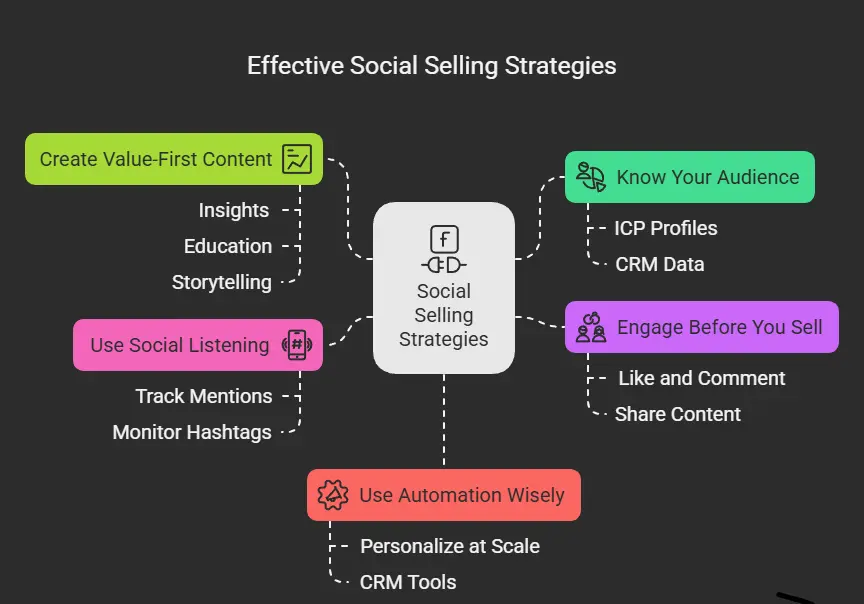
- Connaissez votre public.Créez des profils ICP détaillés.profil ICP à l'aide des données CRM. Cela vous permet d'affiner votre message et votre approche pour cibler précisément les personnes que vous souhaitez atteindre.
- Engagez-vous avant de vendre.Ne vous précipitez pas pour faire votre présentation ! Aimez, commentez, partagez du contenu intéressant et montrez un intérêt sincère pour vos prospects. Soyez présent dans leur univers avant de vendre.
- Créez du contenu axé sur la valeur.Concentrez-vous sur les idées, l'éducation et la narration. Le contenu qui apporte une valeur ajoutée et résout les problèmes de votre public est celui qui attire l'attention.
- Utilisez l'écoute sociale.Suivez les conversations autour de votre niche et engagez-vous lorsque vous trouvez le bon moment. Utilisez des outils pour surveiller les mentions, les hashtags et les mots-clés.
- Utilisez l'automatisation à bon escient.L'automatisation peut aider à développer les efforts de vente sur les réseaux sociaux, mais elle doit toujours rester personnalisée. Ne recourez pas à une automatisation excessive : personnalisez à grande échelle à l'aide d'outils CRM qui permettent l'automatisation sans perdre le contact humain, en particulier lorsque vous gérez une équipe de 20 à 50 professionnels de la vente.
Les 10 meilleurs outils de vente sociale
Découvrez les 10 meilleurs logiciels de vente sociale et outils de vente sociale comparés.
Comparaison des outils de vente sociale
| Outil | Idéal pour | Avantages | Inconvénients | Prix |
|---|---|---|---|---|
| CRM populaire | Gestion des prospects, vente sociale, gestion des relations | Interface utilisateur simple, automatisation intelligente, CRM | Fonctionnalités essentielles uniquement | À partir de $2020 |
| LinkedIn Sales Navigator | Prospection sur LinkedIn | Excellents filtres, informations pertinentes | Coûteux, courbe d'apprentissage abrupte | À partir de $9999 |
| Hootsuite | Planification sociale | Multi-plateforme, analytique | L'interface utilisateur peut sembler dépassée. | À partir de $9999 |
| Sprout Social | Engagement social | Suite complète, adaptée aux équipes | Cher | À partir de $249249 |
| Zoho CRM | CRM + réseaux sociaux | Outils personnalisables et intégrés | Interface utilisateur peu pratique | À partir de $2020 |
| HubSpot | Ventes + CRM | Niveau gratuit, nombreuses fonctionnalités | Peut rapidement devenir coûteux | À partir de 0 $ |
| Tampon | Planification des publications | Interface utilisateur épurée, facile à utiliser | Analyses limitées | À partir de $66 |
| Agile | CRM social | Perspectives relationnelles | Intégrations limitées | À partir de $24.9024.90 |
| Sendible | Agences | Marque blanche, tableaux de bord clients | Interface utilisateur moins moderne | À partir de $2929 |
| Cristal | Analyse de personnalité LinkedIn | Profils psychologiques uniques | Cas d'utilisation spécifique | À partir de $4949 |
1. CRM populaire
Idéal pour
Gestion des relations et automatisation de la prospection. folk CRM est la solution idéale pour les équipes de 20 à 50 personnes qui font du social selling. Elle offre des fonctionnalités CRM intuitives et de puissantes intégrations sociales sur Instagram, LinkedIn, Twitter (X) et WhatsApp.
✔️ Avantages
- Interface conviviale avec une configuration minimale, idéale pour les équipes commerciales de taille moyenne.
- Automatise les suivis tout en conservant une touche personnelle sur toutes les plateformes sociales.
- Intégrations sociales pour toutes les principales plateformes (LinkedIn, Twitter, Instagram, WhatsApp).
- Gestion centralisée des contacts et historique des communications pour des équipes de 20 à 50 professionnels.
- S'adapte parfaitement aux équipes commerciales en pleine croissance sans la complexité des grandes entreprises.
❌ Inconvénients
- Se concentre sur les fonctionnalités essentielles plutôt que sur les outils d'entreprise avancés.
Tarification
À partirde 20 $ par mois et par utilisateur, ce qui le rend rentable pour les équipes de 20 à 50 personnes.
👉🏼 Essayez Folk dès maintenant pour ne jamais manquer un suivi lorsque vous engagez des prospects sur LinkedIn et X.
2. LinkedIn Sales Navigator
Idéal pour
Prospection approfondie sur LinkedIn, gestion des prospects et automatisation des ventes.

✔️ Avantages
- Filtres de recherche avancés pour un ciblage précis des prospects.
- Fournit des mises à jour en temps réel sur les activités des prospects.
- Intégration avec des outils CRM pour un flux de travail fluide.
❌ Inconvénients
- Courbe d'apprentissage pour les nouveaux utilisateurs.
- Coûteux, en particulier pour les petites entreprises.
Tarification
À partirde 9999.
3. Hootsuite
Idéal pour
Planification et surveillance des réseaux sociaux.
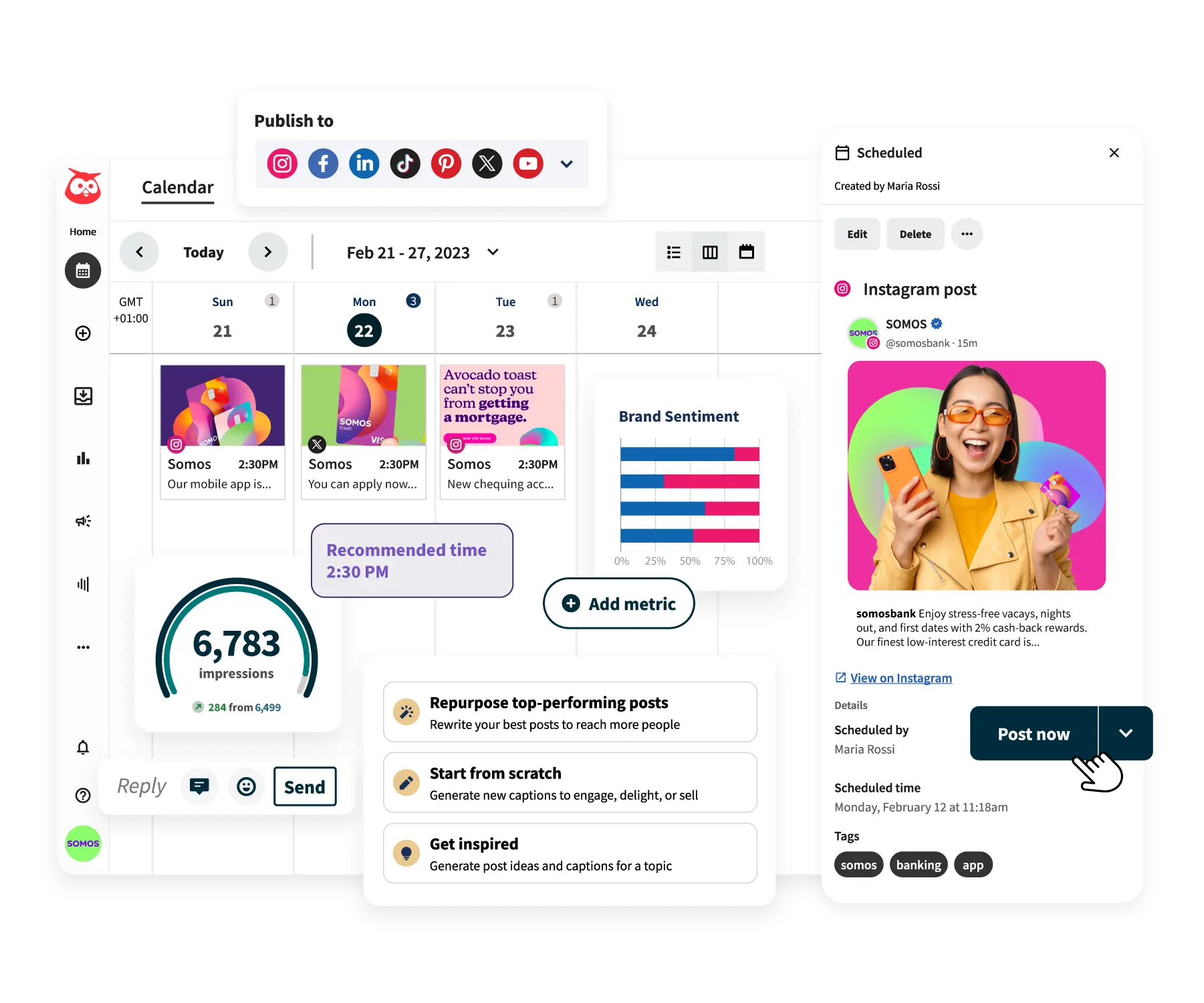
✔️ Avantages
- Prend en charge toutes les principales plateformes sociales.
- Outils d'analyse et de surveillance puissants.
- Idéal pour gérer plusieurs comptes.
❌ Inconvénients
- L'interface peut sembler dépassée.
- Fonctionnalités CRM limitées.
Prix : À partir de 99 $ par mois.
4. Sprout Social
Idéal pour
Équipes ayant besoin de fonctionnalités avancées d'engagement social.
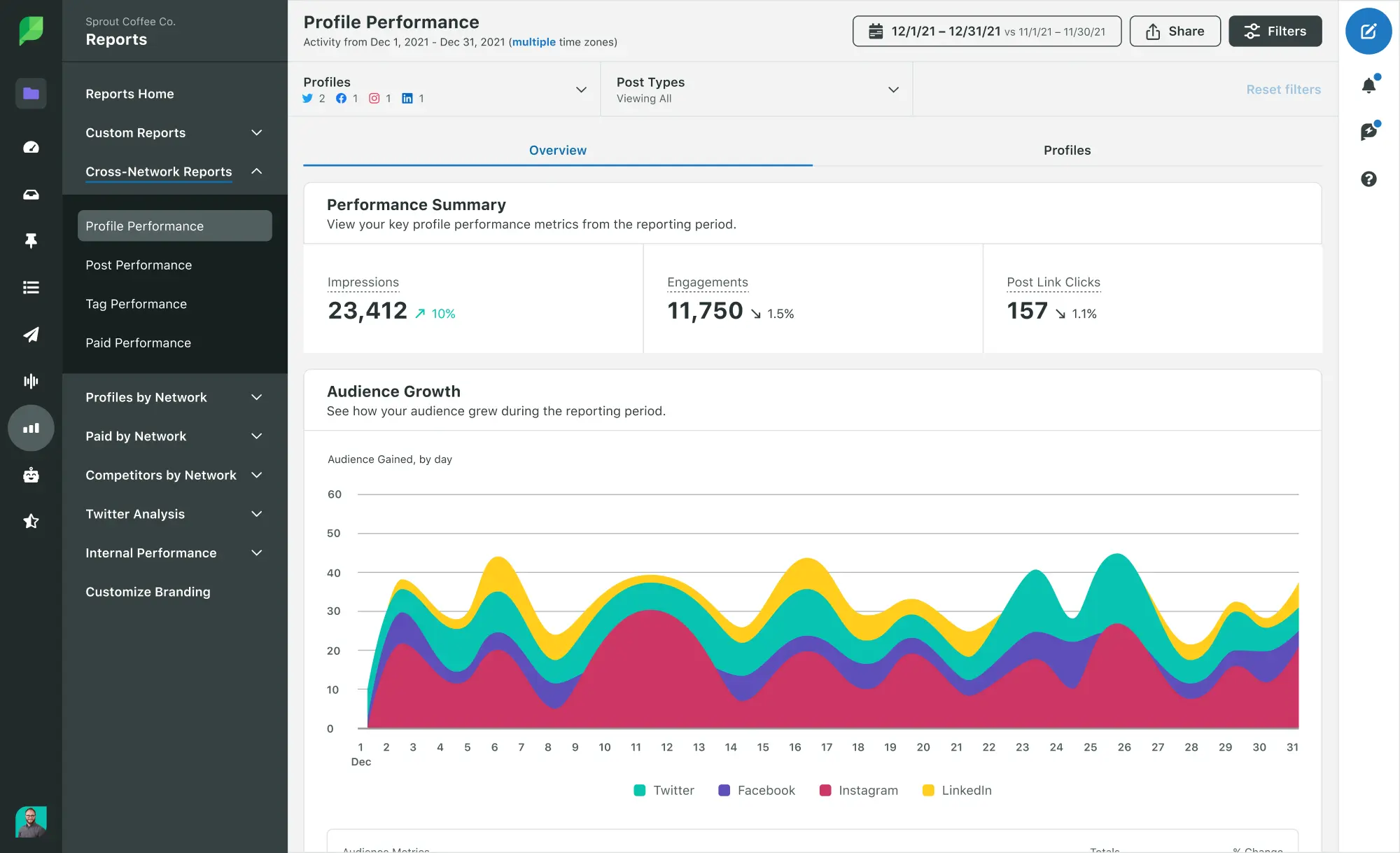
✔️ Avantages
- Suite complète de gestion des réseaux sociaux.
- Excellentes fonctionnalités de collaboration en équipe.
- Outils d'analyse et de reporting détaillés.
❌ Inconvénients
- Les prix peuvent être prohibitifs pour les entrepreneurs indépendants ou les petites équipes.
Tarification
À partirde 249249.
5. Zoho CRM
Idéal pour
CRM combiné à l'intégration des réseaux sociaux.

✔️ Avantages
- Prix abordables avec de nombreuses options de personnalisation.
- Intègre les plateformes de réseaux sociaux telles que Twitter et Facebook.
- Workflows personnalisés et gestion des prospects.
❌ Inconvénients
- L'interface utilisateur semble peu pratique et obsolète.
Tarification
À partirde 2020.
6. HubSpot
Idéal pour
Automatisation des ventes et CRM avec fonctionnalités de marketing entrant.

✔️ Avantages
- Formule gratuite généreuse avec les fonctionnalités essentielles.
- Excellent service client et ressources pédagogiques.
- Interface facile à utiliser.
❌ Inconvénients
- Les coûts peuvent rapidement augmenter à mesure que vous vous développez.
- Intégrations limitées aux réseaux sociaux par rapport à d'autres outils.
Tarification
Plan gratuitdisponible, plans payants à partir de 18 $/mois.
7. Tampon
Idéal pour
Planification et publication de messages sur plusieurs réseaux sociaux.
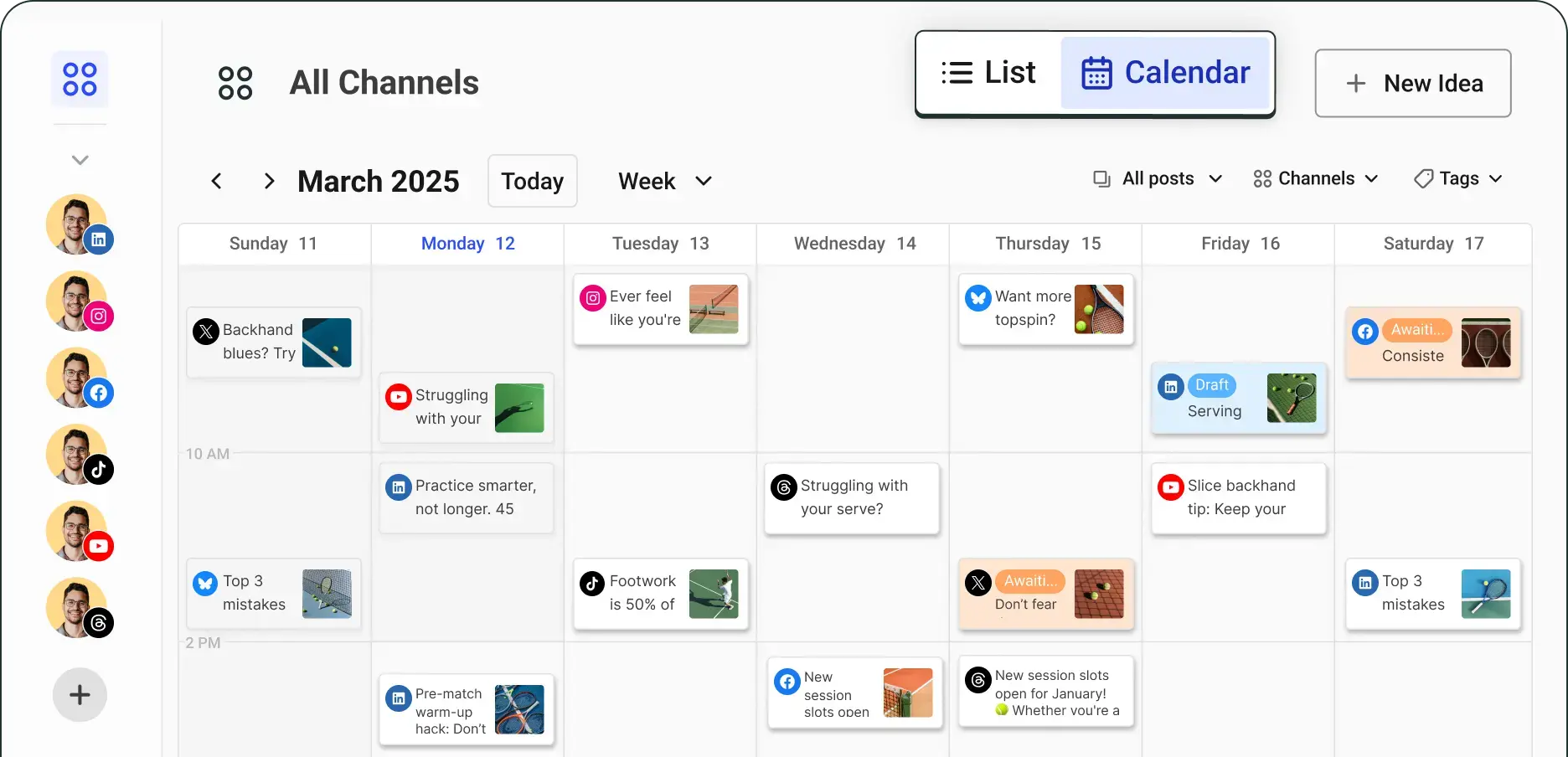
✔️ Avantages
- Interface utilisateur claire et simple.
- Faible coût, ce qui le rend adapté aux start-ups et aux entrepreneurs indépendants.
- Fonctionne bien avec Instagram, Twitter et LinkedIn.
❌ Inconvénients
- Outils d'analyse et de reporting limités.
Tarification
À partirde 66.
8. Agile
Idéal pour
Établissement de relations et connaissances sociales.
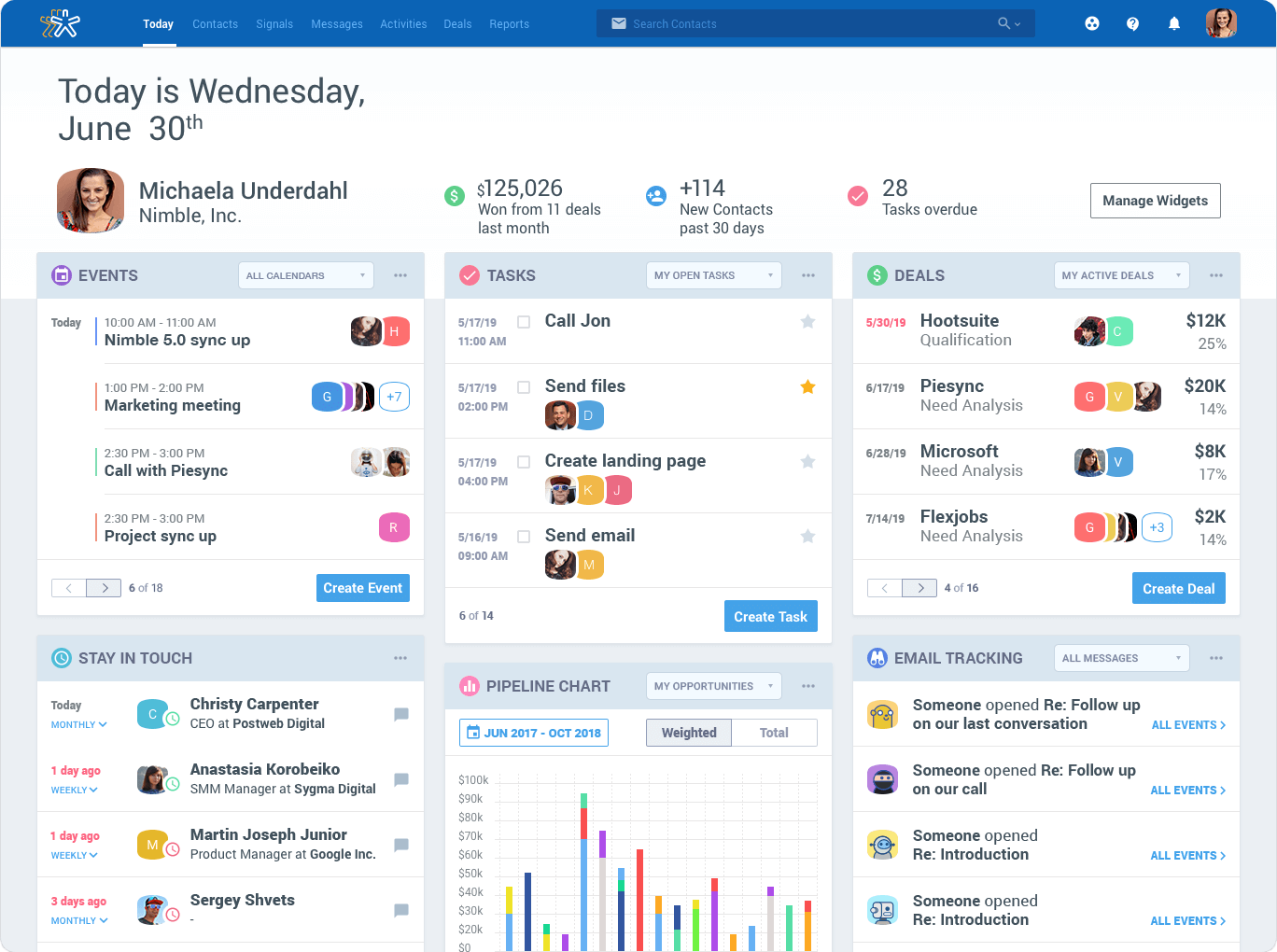
✔️ Avantages
- Suivi des conversations sociales et fourniture d'informations exploitables.
- S'intègre parfaitement à LinkedIn et à d'autres plateformes sociales.
- Conçu pour les petites entreprises et les entrepreneurs indépendants.
❌ Inconvénients
- Intégrations limitées en dehors des réseaux sociaux.
Tarification
À partirde 24.9024.90.
9. Sendible
Idéal pour
Agences qui gèrent les profils sur les réseaux sociaux de plusieurs clients.
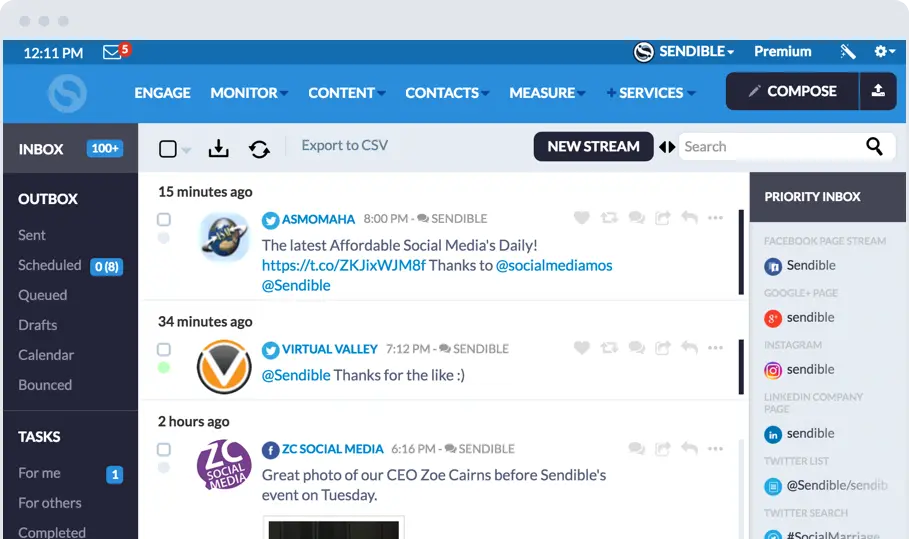
✔️ Avantages
- Fonctionnalités de marque blanche et de reporting client.
- Prise en charge multi-plateforme, notamment Instagram, Twitter, LinkedIn, etc.
- Idéal pour gérer des équipes.
❌ Inconvénients
- L'interface semble un peu dépassée.
Tarification
À partirde 2929.
10. Cristal
Idéal pour
Analyser les traits de personnalité et adapter les messages.
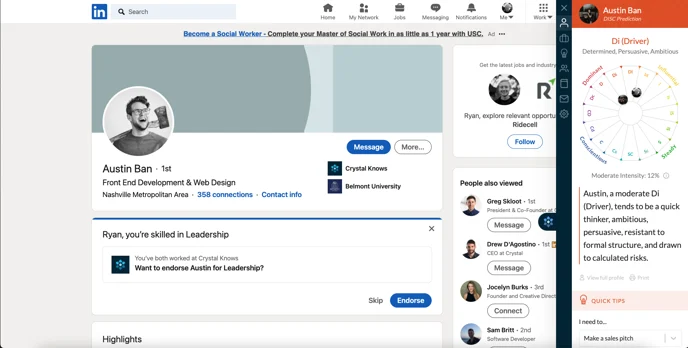
✔️ Avantages
- Capacité unique d'analyser les profils LinkedIn et de proposer des conseils de communication en fonction des types de personnalité.
- Aide à rédiger des messages plus personnalisés pour la vente sur les réseaux sociaux.
❌ Inconvénients
- Limité à LinkedIn uniquement.
- Cas d'utilisation spécifique.
Tarification
À partirde 4949.
Statistiques sur le social selling en 2025
- 78 % des vendeurs sociaux vendent plus que leurs pairs qui n'utilisent pas les réseaux sociaux. Source
- 76 % des acheteurs sont prêts à discuter sur les réseaux sociaux. Source
- Les entreprises qui ont des processus de vente sociale cohérents ont 40 % plus de chances d'atteindre leurs objectifs de chiffre d'affaires. Source
- LinkedIn est la plateforme n° 1 pour la génération de prospects B2B. Source
Prêt à booster les efforts de vente sociale de votre équipe ? Pour les équipes commerciales de 20 à 50 personnes à la recherche d'un équilibre parfait entre fonctionnalité et simplicité, folk CRM offre tout ce dont vous avez besoin pour gérer la vente sociale à grande échelle sans la complexité des outils d'entreprise. Essayez folk dès aujourd'hui.
FAQ
Qu'est-ce que la sensibilisation dans les médias sociaux ?
La communication sur les réseaux sociaux consiste à interagir de manière proactive avec des prospects via des commentaires, des messages privés, des mentions et des partages afin d'engager des conversations pertinentes, d'instaurer un climat de confiance et d'amener les prospects vers un dialogue commercial sans avoir recours à la prospection à froid.
Comment se lancer dans le social selling ?
Définissez les ICP, suivez les objectifs, engagez-vous avant de présenter votre offre, partagez du contenu utile, utilisez l'écoute sociale, personnalisez les messages privés et consignez chaque point de contact dans un CRM. La cohérence est la clé du succès ; cherchez à apporter une valeur ajoutée à chaque interaction.
Quelles sont les plateformes les plus efficaces pour le social selling ?
LinkedIn pour la prospection B2B et le contenu, X (Twitter) pour les conversations et les recherches en temps réel, Instagram pour le storytelling visuel et l'affinité avec la marque. Choisissez les réseaux sur lesquels vos acheteurs sont les plus actifs.
Quels outils facilitent la vente sociale ?
Utilisez un CRM pour suivre les contacts et les messages, un outil de veille sociale pour les mentions/mots-clés et un planificateur pour les publications. Une option légère comme Folk centralise la communication et automatise les suivis.
Découvrez l'
CRM folk Comme l'assistant commercial que votre équipe n'a jamais eu


